At the Paris Air Show, our editor-in-chief had the great privilege of interviewing Mathieu Kassovitz. The French actor and director visited the Venturi Space stand on the first day of the show. He answered DirectIndustry’s questions about his interest in space and how cinema has a stake in embracing technology—especially the kind we frequently discuss here, like AI or LiDAR.
What a surprise it was to meet Mathieu Kassovitz, the unforgettable actor from Amélie and talented director of La Haine, on the opening day of the Paris Air Show. What was he doing in this professional fair, among military aircraft, jumbo jets, new airliners, and helicopters?
We’re more used to seeing Mathieu Kassovitz, the brilliant French actor and cult film director, on movie sets and red carpets. Yet, it was at the Paris Air Show in Le Bourget last week that we met him. He was visiting the stand of Venturi Space, the European company planning to send a rover to the Moon’s south pole (read our article on the subject).
And it’s no coincidence we found the brilliant Malotru from Le Bureau des Légendes (a French spy series adapted into the American The Agency) near Venturi Space’s MONA LUNA rover. Kassovitz co-founded a production company, Venturi Production, with none other than the president of Venturi Space, Gildo Pastor. We couldn’t resist asking him a few questions. He shared his passion for space and for the technologies within space equipment, which he sees as having applications in cinema.
Upon reflection, it made sense. Kassovitz has directed several sci-fi films that feature futuristic flight technology. With his new production company and a slate of ambitious projects, our conversation quickly turned to space, the ISS, innovation, and filmmaking.
And yes, this also happens to be Mathieu Kassovitz’s first B2B interview in English!
Watch our video interview
Where does your interest in aeronautics and space come from?
Mathieu Kassovitz: “Actually, I discovered aeronautics in 1994 when I flew to New York on the Concorde for my first film. My producer, Christophe Rossignon, an engineer and space enthusiast, managed to get us seats. That flight was an extraordinary moment. I spoke for two hours with the captain and the flight crew. I started asking questions about physics. I had no idea an aircraft could fly like that—I didn’t understand fluid mechanics or combustion. That’s when I began to dive into it. Then I discovered space. I discovered physics. I discovered science. I’ve been passionate about science at every level for over 20 years—along with the technology that comes with it. I think it’s the pinnacle of what humans can achieve with tools and our brains—for both good and bad. But when we talk about space, we’re still in the “good” category, and I hope that lasts a while longer.”
You founded Venturi Production. What’s the link with Venturi Space, the company planning to send a rover to the Moon?
Mathieu Kassovitz: “Gildo Pastor, president of Venturi Space, has been developing electric cars for a long time. I got interested in that too, about 20 years ago, when I was making Babylon A.D. and asked him for his cars. We got in touch, and I began working on a film set on the ISS—a project I wanted to film in zero gravity with astronaut Jean-François Clervoy. We did tests for years… then Gravity came out, so I dropped it. But my friendship and passion for space continued. The film became less important than everything I learned and all the incredible people I met thanks to it.
That’s one of the perks of being a filmmaker—you get to meet fascinating people. For The Wolf’s Call, I met submarine captains, pilots—some of the best. Some of them fly zero-G planes; they’re A300 pilots and are absolutely incredible. So I ended up stepping outside the usual cinema world. When I found out Gildo was entering the space sector, I thought: how funny that our paths cross again. Cinema is evolving. We’ve been in a transition from analog to digital for 20 years now. With the rise of AI, if we don’t take control of technology ourselves, it’ll take control of us.
As an artist, I fear becoming a prisoner of technology. That’s why I want to develop tools that allow artists—and humans, really—to interact with AI in creative, not restrictive, ways. Generative AI isn’t always intelligent or meaningful.”
What film projects are you developing that are linked to technology?
Mathieu Kassovitz: “I’ve been developing several projects for a long time—for example, the one on the space station. Another one features an engineer who invents a time machine and meets multiple versions of himself throughout his life. I also have a Matrix-style project about controlling time and space. These are all scripts I could pitch to Netflix or others, as a writer-director wanting to make a film or a series. But I want to create films that are also playable. I’ve done my time in traditional cinema. I had the immense luck of growing up with film stock. I’m very sad we’ve moved to digital. But since we have, let’s go all in and use digital for everything it can offer.
For example, today’s cameras still work the same as before. They’re more sensitive and can see in the dark, but they still just capture photons. LiDAR, which is on every smartphone, isn’t yet integrated into cinema cameras. If we could integrate real imagery with computer code that understands what’s being filmed, we’d unlock new creative freedom. That hasn’t happened yet. We need to look into it. And again, AI must absolutely be controlled.
We need major European AIs, because the U.S. and Asia don’t have the same copyright issues we do.”
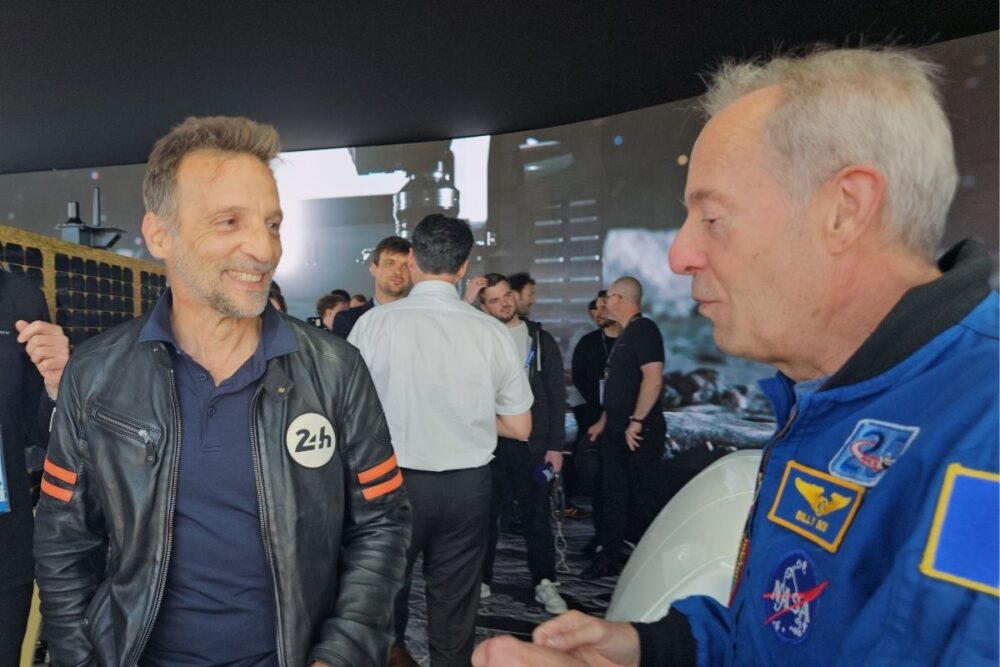
You said earlier that cinema is changing. We’ve gotten used to ultra-digitized special effects, which are starting to bore audiences. Will capturing more real images in space motivate you?
Mathieu Kassovitz: “There will be two kinds of cinema. One will remain human-based, like going to the theater—real films with real people. And one entirely made with CGI. But even in “traditional” films today, it’s hard to know what’s real. The more realistic it looks, the more likely it is digital effects. And now we’re starting to see AI actors—cheap, obedient, and increasingly emotive. We’re from a different era—I’m from the last century. But kids born today interact with AIs much more naturally. This will only grow. So I think cinema will split: one side will remain human, the other hybrid.
Right now, I could film you, give you lines, and later replace your image with someone else’s—place the camera wherever I want. That’s the hybrid we’re entering. Eventually, we may not even need actors at all. Just talk to someone on a screen, who ends up in a robot, and those robots will look more and more human. Look at how far robots have come in just five years. Imagine 100 years from now—we’ll be in full sci-fi territory. Blade Runner, Matrix…”
But is this inspiring for you as an artist?
Mathieu Kassovitz: “It’s terrifying. I’d rather we all lived naked in nature milking cows, without phones. But we are moving forward, so let’s try to use this intelligence as wisely as we can. The problem isn’t artificial intelligence—it’s human stupidity. It’s great to build amazing machines. But turning them into missiles? That’s on us. Machines don’t ask to be used that way. They offer options and capabilities. It’s up to us to choose how we use them.”
What are you planning to see at the show? There’s a lot of defense tech here—many killing machines.
Mathieu Kassovitz: “I’m planning to buy a plane. I just need to find someone to finance it! (Laughs). I’ve got a French friend who makes flight simulators. I’m going to see his machine. And I love helicopters, so I’ll check those out too.”
Will Venturi Production seek collaborations with space agencies like ESA or CNES for content and realism?
Mathieu Kassovitz: “Yes, that’s part of the plan. We want to do documentaries—like one about what they’re doing with the Moon—but treated cinematically and with long-term relevance. More importantly, these machines have sensors and cameras. I want to reuse that technology for filming on Earth.
All this space and military tech eventually trickles down to consumer use. First it’s professional, then it spreads. For example, cinema dollies in the 1950s—used to move cameras up and down on rails—were based on bomb and missile hoists used on aircraft. The cameras used by Godard to create the New Wave were 16mm spring-wound military cameras.
So yes, military and space technologies always eventually trickle down. And in cinema, that’s part of our DNA. Cameras are going to be increasingly controlled by robots. It’s going to get easier and easier.”
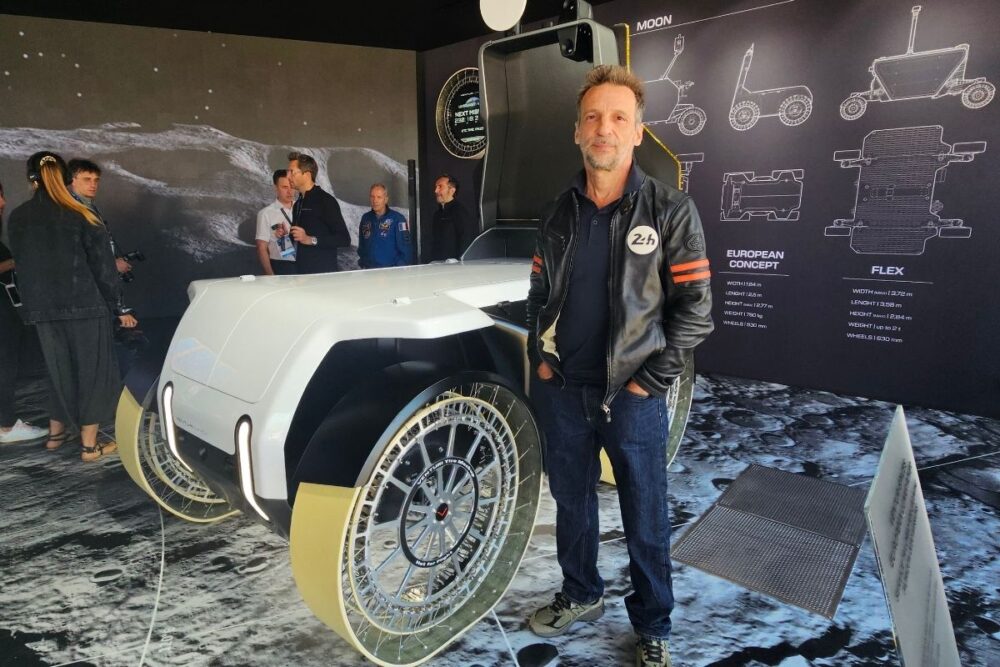
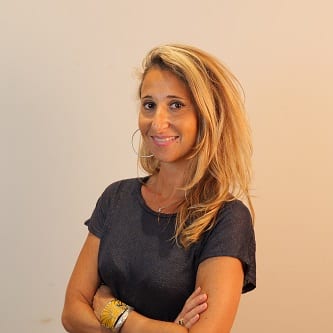




![Image [BUYING GUIDE] How to Choose the Right Industrial Robot?](/wp-content/uploads/sites/3/Industrial-Robot-320x213.jpg)
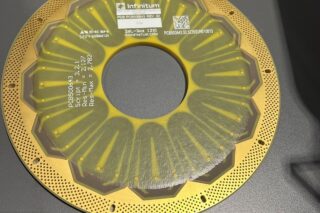
![Image [Buying Guide] How to Choose the Right Safety Shoes?](/wp-content/uploads/sites/3/Safety-Shoes-320x213.jpg)

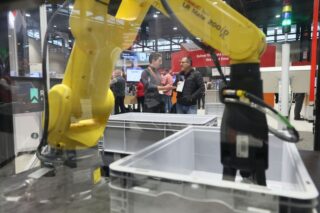
![Image [Buying Guide] How to Choose the Right AMR?](/wp-content/uploads/sites/3/AMR-320x213.jpg)